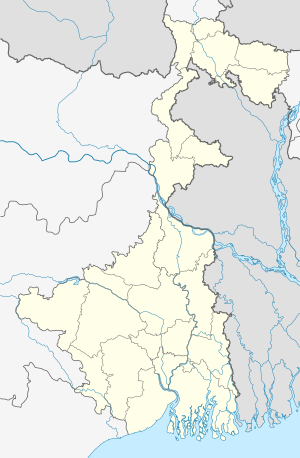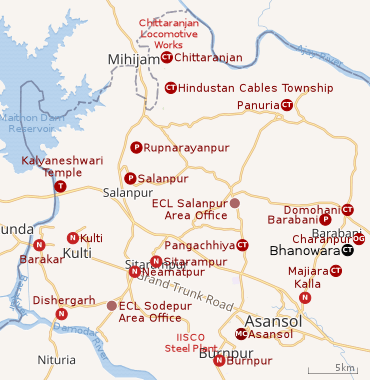Bhanowara
Bhanowara is a census town in the Barabani CD block in the Asansol Sadar subdivision of the Paschim Bardhaman district in the state of West Bengal, India.
Bhanowara | |
|---|---|
Census Town | |
 Bhanowara Location in West Bengal, India  Bhanowara Bhanowara (India) | |
| Coordinates: 23.738643°N 87.027553°E | |
| Country | |
| State | West Bengal |
| District | Paschim Bardhaman |
| Area | |
| • Total | 4.11 km2 (1.59 sq mi) |
| Population (2011) | |
| • Total | 8,555 |
| • Density | 2,100/km2 (5,400/sq mi) |
| Languages* | |
| • Official | Bengali, Hindi, English |
| Time zone | UTC+5:30 (IST) |
| Vehicle registration | WB |
| Website | paschimbardhaman |
Geography
 |
| Cities, towns and ECL Areas in the western portion of Asansol Sadar subdivision in Paschim Bardhaman district MC: municipal corporation, P: rural administrative centre, CT: census town, N: neighbourhood, OG: out growth, T: temple Owing to space constraints in the small map, the actual locations in a larger map may vary slightly |
Location
Bhanowara is located at 23°44′19″N 87°01′39″E.
The Asansol-Durgapur region has undulating laterite soil. This area lies between two rivers – the Damodar and the Ajay. They flow almost parallel to each other in the region – the average distance between the two rivers is around 30 km. For ages the area was heavily forested and infested with plunderers and marauders. The discovery of coal in the 18th century led to industrialisation of the area and most of the forests have been cleared.[1]
Pangachhiya, Majiara, Bhanowara, Domohani, Charanpur (OG), Ratibati and Chelad form a cluster of census towns and an outgrowth on the northern and eastern sides of Asansol.[2]
Urbanisation
As per the 2011 census, 83.33% of the population of Asansol Sadar subdivision was urban and 16.67% was rural.[3] In 2015, the municipal areas of Kulti, Raniganj and Jamuria were included within the jurisdiction of Asansol Municipal Corporation.[4]Asansol Sadar subdivision has 26 (+1 partly) Census Towns.(partly presented in the map alongside; all places marked on the map are linked in the full-screen map).
Demographics
According to the 2011 Census of India Bhanowara had a total population of 8,855 of which 4,627 (52%) were males and 4,228 (48%) were females. Population in the age rage of 0-6 years was 1,188. The total number of literate persons in Bhanowara was 5,452 (71.11% of the population over 6 years).[5]
*For language details see Barabani (community development block)#Language and religion
According to the 2011 census, the urban agglomeration (UA) centred upon Asansol had a population of 1,243,414. In addition to the erstwhile municipalities of Kulti, Jamuria, and Raniganj subsequently incorporated into the Asansol Municipal Corporation, the agglomeration included the census towns of Amkula, Baktarnagar, Ballavpur, Bhanowara, Domohani, Egara, Jemari (J.K. Nagar Township), Majiara, Murgathaul, Raghunathchak, Sahebganj and Topsi, and also Charanpur, an outgrowth of Jamuria.[6][4]
As of 2001 India census,[7] Bhanowara had a population of 7,732. Males constitute 53% of the population and females 47%. Bhanowara has an average literacy rate of 58%, lower than the national average of 59.5%; with male literacy of 68% and female literacy of 47%. 13% of the population is under 6 years of age.
Infrastructure
According to the District Census Handbook 2011, Bardhaman, Bhanowara covered an area of 4.11 km2. Among the civic amenities, it had 13 km roads with open drains, the protected water supply involved overhead tank, tap water from treated sources. It had 1,020 domestic electric connections and 10 road lighting (points). Among the medical facilities it had 1 dispensary/ health centre. Among the educational facilities it had were 3 primary schools, the nearest middle school, secondary school and senior secondary school 3/4 km away, the nearest general degree college at Asansol 9 km away. Among the important commodities it produced was bricks. It had the branch office of 1 nationalised bank, 1 non-agricultural credit society.[8]
Economy
As per ECL website telephone numbers, operational collieries in the Sripur Area of Eastern Coalfields in 2018 are: Bhanora West Block Colliery, Girmint Colliery, New Ghusick Colliery, Kalipahari Colliery, Ningha Colliery and S.S.I. Colliery.[9]
Education
Bhanowara has five primary schools.[10]
Healthcare
Medical facilities (dispensaries) in the Sripur Area of ECL are available at Nigha (PO Nigha), SSI Dispensary (PO Nigha), Kalipahari (PO Kalipahari), New Ghusick (PO Kalipahari), Muslia (PO Kalipahari), Dhamra (PO Kalipahari), Bhanora (PO Bhanora), Girmint (PO Bhanora), Sripur Area (PO Sripur Bazar), Sripur (PO Sripur Bazar), IME/PME (PO Sripur Bazar).[11]
References
- Chattopadhyay, Akkori, Bardhaman Jelar Itihas O Lok Sanskriti (History and Folk lore of Bardhaman District.), (in Bengali), Vol I, pp 14-15, Radical Impression. ISBN 81-85459-36-3
- "Census of India 2011, West Bengal: District Census Handbook, Barddhaman" (PDF). Map of Barabani CD Block, page 167 and Map of Raniganj CD Block, page 215. Directorate of Census Operations, West Bengal. Retrieved 31 August 2018.
- "District Statistical Handbook 2014 Burdwan". Table 2.2, 2.4(a). Department of Statistics and Programme Implementation, Government of West Bengal. Archived from the original on 21 January 2019. Retrieved 4 September 2018.
- "The Kolkata Gazette" (PDF). Notification No. 335/MA/O/C-4/1M-36/2014 dated 3 June 2015. Department of Municipal Affairs, Government of West Bengal. Archived from the original (PDF) on 12 March 2017. Retrieved 4 September 2018.
- "2011 Census – Primary Census Abstract Data Tables". West Bengal – District-wise. Registrar General and Census Commissioner, India. Retrieved 18 February 2017.
- "Constituents of Urban Agglomerations having population 1 lakh and above" (PDF). Provisional Population Total, Census of India 2011. Government of India. Retrieved 27 August 2018.
- "Census of India 2001: Data from the 2001 Census, including cities, villages and towns (Provisional)". Census Commission of India. Archived from the original on 16 June 2004. Retrieved 1 November 2008.
- "District Census Handbook Barddhaman, Census of India 2011, Series 20, Part XII A" (PDF). Section II Town Directory, Pages 1179-1210; Statement I: Status and Growth History, Page 1179; Statement II: Physical Aspects and Location of Towns, Page 1188; Statement III: Civic and other Amenities, Page 1191; Statement IV: Medical Facilities, Page 1196; Statement V: Educational, Recreational and Cultural Facilities, Page 1200; Statement VI:Industry and Banking, Page 1209:. Directorate of census Operations V, West Bengal. Retrieved 14 May 2020.CS1 maint: extra punctuation (link)
- "Area wise Closed User Group (CUG) Telephone Numbers" (PDF). Sripur Area. Eastern Coalfields Limited. Retrieved 11 August 2018.
- 7th All-India School Education Survey 2003 Archived 2007-09-27 at the Wayback Machine
- "Details of medical facilities in CIL and its subsidiaries". ECL. CIL. Retrieved 15 May 2020.